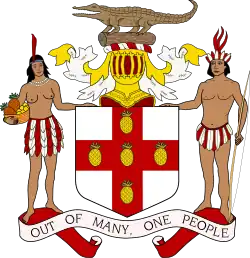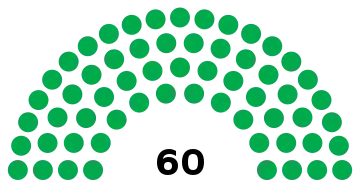1983 Jamaican general election
Early general elections were held in Jamaica on 15 December 1983.[1] The election was effectively ended as a contest when the main opposition party, the People's National Party, boycotted the election to protest the refusal of the ruling Jamaican Labour Party to update the electoral roll amid allegations of voter fraud.[2]
| |||||||||||||||
All 60 seats in the House of Representatives 31 seats needed for a majority | |||||||||||||||
| |||||||||||||||
 |
|---|
|
|
Several minor parties participated in the election, but they only contested six of the 60 seats: with voter turnout of about 55%, this gave a nationwide figure of a meagre 2.7%.[1][3] The Labour Party won all 60 seats in the House of Representatives, with their leader, Edward Seaga, continuing as Prime Minister.
Background
The Labour Party had convincingly won the 1980 general election, taking 51 of the 60 seats in the House of Representatives. At the time, the party had promised to update the electoral roll, but failed to do so by the 1983 elections.[2] On 25 November 1983, Seaga called early elections, two years before they were due.[3] Seaga claimed that the move was due to People's National Party leader Michael Manley calling for him to resign from his post of Finance Minister (which he held in addition to being Prime Minister), and that the early elections would be a public vote of confidence in his austerity plans.[3]
Whilst the People's National Party boycotted the elections and called for others to do so as well, three minor parties and several independents contested the elections. Two of the parties, the Christian Conscience Movement and the Jamaica United Front, had never previously contested an election. The other, the Republican Party, had run in the 1955 and 1967 elections, but had never received more than 108 votes.[4] Between them, opposition and independent candidates only contested six constituencies, resulting in Labour Party candidates winning 54 seats unopposed. Whilst turnout in the contested seats was estimated to be around 55%,[3] the overall total was just 2.7%, by far the lowest in the country's history and one of three occasions (the others being 2016 and 2020) it has been below 50%.[1]
Results
 | |||||
|---|---|---|---|---|---|
| Party | Votes | % | Seats | +/– | |
| Jamaica Labour Party | 23,363 | 89.67 | 60 | +7 | |
| Christian Conscience Movement | 704 | 2.70 | 0 | New | |
| Republican Party | 257 | 0.99 | 0 | New | |
| Jamaica United Front | 144 | 0.55 | 0 | New | |
| Independents | 1,587 | 6.09 | 0 | 0 | |
| Total | 26,055 | 100.00 | 60 | 0 | |
| Valid votes | 26,055 | 98.16 | |||
| Invalid/blank votes | 488 | 1.84 | |||
| Total votes | 26,543 | 100.00 | |||
| Registered voters/turnout | 990,586 | 2.68 | |||
| Source: Nohlen | |||||
Aftermath
The Labour Party government was sworn in on 19 December,[3] and remained in power until the 1989 elections, in which the People's National Party won 45 of the 60 seats.[5]
On 30 December Governor-General Florizel Glasspole appointed eight independent senators; Clarence Reid, Charles Sinclair, Emil George, Errol Miller, Lloyd Barnett, Courtney Lloyd Fletcher, Barbara Makeda Blake and Keith Worrell, who were recommended by Seaga.[6]
References
- Dieter Nohlen (2005) Elections in the Americas: A data handbook, Volume I, p430 ISBN 978-0-19-928357-6
- Nohlen, p425
- Jamaica Inter-Parliamentary Union
- Nohlen, pp433-434
- Nohlen, p435
- G-G appoints eight opposition Senators on PM's recommendation Kingston Gleaner, 30 December 1983